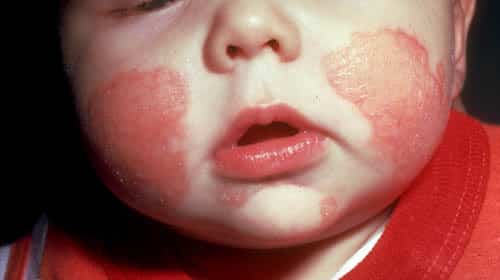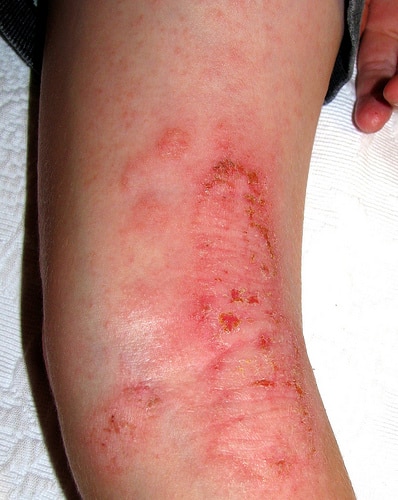Eczema is a category of skin disease that is characterized by inflammation, itching, dry scaly skin, and in severe cases, small fluid filled blisters and insomnia. It is the most common skin disease in children today. Mild cases of Eczema are a little worse than a tendency toward dry, itching skin. Severe cases can affect the whole body, can be intensely itchy, uncomfortable, and even have an effect on the person in a psychological manner due to self-consciousness. Eczema sufferers have acute flare-ups or relapses of their chronic disease that can be annoying, itchy, and very uncomfortable.
HOW DO YOU GET ECZEMA?
Eczema is not a contagious skin disease, but it does effect around 1 in 10 people. Its causes aren’t fully understood yet, but eczema  seems to occur in people with family or personal history of allergic asthma, rhinitis, conjunctivitis, food allergies, icthyosis vulgaris, and keratosis pilaris. Eczema has always seemed to be a genetic skin disease, but until recently the researchers have been unable to identify a specific gene involved in the passing on of eczema. Now, doctors believe they have found a gene that causes eczema, but since it is not present in all cases of eczema, they believe that there is more than one gene that can cause eczema. Also, a maternal pattern of inheritance has been discovered. Doctors and researchers believe that this maternal inheritance pattern is due to modification in the immune responses in utero, or via breast milk.
seems to occur in people with family or personal history of allergic asthma, rhinitis, conjunctivitis, food allergies, icthyosis vulgaris, and keratosis pilaris. Eczema has always seemed to be a genetic skin disease, but until recently the researchers have been unable to identify a specific gene involved in the passing on of eczema. Now, doctors believe they have found a gene that causes eczema, but since it is not present in all cases of eczema, they believe that there is more than one gene that can cause eczema. Also, a maternal pattern of inheritance has been discovered. Doctors and researchers believe that this maternal inheritance pattern is due to modification in the immune responses in utero, or via breast milk.
CAN ECZEMA BE CURED?
There is no way to absolutely “cure” eczema although; many treatments have been found to be effective. Now, with the wonderful discovery of one of the genes that may cause eczema, who knows what, will happen. They are working on ways to permanently rid people of eczema all the time, but knowing exactly where the “instructions” on how to create the disease are located make finding a cure more likely.
WHAT CAUSES ECZEMA TO FLARE UP?
There are many things that can trigger or worsen cases of eczema. The number one cause of eczema flare-ups is emotional stress. Anger, frustration, anxiety, family hostility, rejection, and guilt can complicate the problem of eczema. Irritants such as soaps, solvents, and laundry detergent can provoke it also. The only way to keep irritants from triggering eczema is to avoid them by using substitutes like a non-soap cleaning agent. Allergens in food and the air can also cause eczema to flare-up. Dietary management and air purifiers can help keep allergens under control. Infections of both a viral and bacterial nature can cause eczema to relapse. When the immune system is weak from illness, eczema sufferers are more prone to break outs of greater seriousness and discomfort.
WHAT ARE SOME COMMON TYPES OF ECZEMA?
There are many forms of eczema. Some forms are not specific and cannot be clearly categorized although, most cases fit into one of  the following categories:
the following categories:
- Atopic Eczema is the most persistent kind of eczema, and is often the hardest kind to treat. It is also the most common form of eczema, and it usually develops in the first year of a baby’s life. The most frequent sites for atopic eczema, or atopic dermatitis as it is sometimes referred to, are the elbows, the knees, the neck, and around the eyes. Atopic Eczema usually disappears as a child grows older, but sometimes it does persist through adulthood.
- Numular Eczema is characterized by its round patches of discolored dry skin. These patches can occur anywhere and are occasionally hard to treat, requiring intralesional corticoids.
- Asteatotic Eczema is the result of extremely dry skin. This form of eczema occurs most frequently on the arms and legs.
- Eyelid Eczema is a form of eczema that occurs on the eyelids often causing the eyelids to swell, and in extreme cases become swollen shut. Eyelid eczema can be made worse by use of eye cosmetics, facial cosmetics, and harsh soaps.
- Contact Eczema is divided into two separate types, allergic and irritant. Allergic contact eczema is caused by direct contact with a substance that causes an allergic reaction. The trigger substances can be everyday items such as rubber, glue, and nickel found in some costume jewelry. Irritant contact eczema is caused by things that irritate the skin such as detergents and disinfectants. Contact eczema is also called contact dermatitis.
- Seborrhoeic Eczema affects the scalp and eyebrows and may spread to other parts of the body where there is hair. Seborrhoeic eczema often effects babies and is nicknamed cradle cap.
WHAT ARE POSSIBLE TREATMENTS FOR RELIEF OF ECZEMA’S SYMPTOMS?
The main treatments offered to an eczema patient are emollients and topical steroids. Another possible treatment is antihistamines and antibiotics taken orally, but they are a rare last resort. Emollients are mixtures of oils, fats, and water that help to restore both the moisture and oil content to the skin. They are available in the forms of cream, ointment, lotions, and medicinal bath oils, and are sold by prescription. Emollients need to be used several times a day, even when the skin is apparently free of eczema. Topical steroids are carefully designed anti-inflammatory medicines that are used to bring eczema under control quickly. They soothe inflammation and itching, reduce the risk of infection, and help the skin heal. Topical steroids are available in ointments, creams, and lotions, and are only available through prescription.
